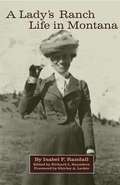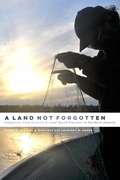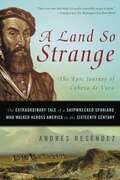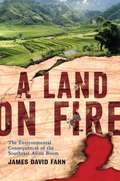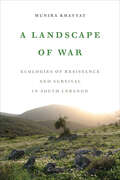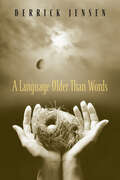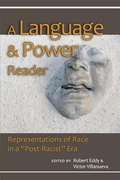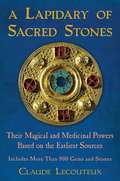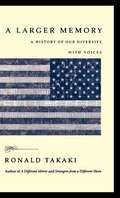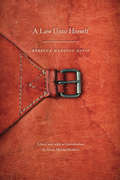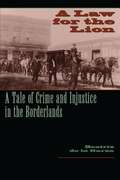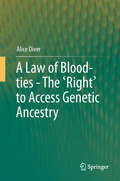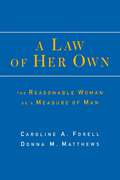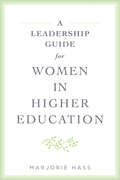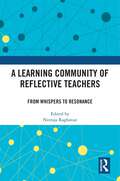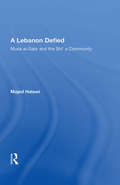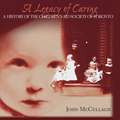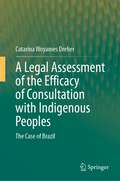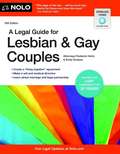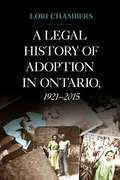- Table View
- List View
A Lady Awakened: Blackshear Family Book 1 (Blackshear Family)
by Cecilia GrantFans of Eloisa James, Sherry Thomas, Courtney Milan and Grace Burrowes will adore Cecilia Grant's emotionally rich and deeply passionate Regency romance.Newly widowed and desperate to protect her estate from her malevolent brother-in-law, Martha Russell conceives a daring plan. Or rather, a daring plan to conceive. If she has an heir on the way, her future will be secured. Forsaking all she knows of propriety, Martha approaches her neighbor, a London exile with a wicked reputation, and offers a strictly business proposition: a month of illicit interludes...for a fee. Theophilus Mirkwood ought to be insulted. But how can he resist this siren in widow's weeds, whose offer is simply too outrageously tempting to decline? Theo endeavors to awaken this shamefully neglected beauty to pleasure - only to find her dead set against taking any enjoyment in the scandalous bargain. Surely she can't resist him for ever. But could her surrender open their hearts to the most unexpected arrival of all...love?For more powerful, sensual romance, lose yourself in the Blackshear Family series: A Christmas Gone Perfectly Wrong, A Lady Awakened, A Gentleman Undone, A Woman Entangled.
A Lady Undone: A Mad Passions Novella 2.5 (Mad Passions)
by Maire ClaremontIn this dazzling novella from the award-winning author of The Dark Lady and Lady In Red, comes a story of fatal plots, seductive spies, and irresistible passions... Perfect for fans of Sherry Thomas, Lisa Kleypas and Stephanie Laurens.Duchess Clare Ederly is lucky to be alive. Having outlived her violent, abusive husband, she decides to put her significant inheritance to good use helping other battered women by opening a refuge for those seeking to escape. But not everyone is pleased with her work. Someone wants to see her sanctuary torn down - at any cost. Her only hope of protecting her home and tenants is a former spy, whose skill at tracking deadly men is matched only by his dangerous charm...The Earl of Wyndham has done his part for Queen and country; he has had his fill of plotting and politics and simply wants to retire to the pleasant life of his club. But Duchess Clare's razor-sharp wit and fierce determination awaken new purpose and admiration in him. To protect her, he will once again delve into the treacherous world of espionage. To win her love, he will do almost anything...For more deliciously dark Victorian romance, try all the titles in the Mad Passions series: The Dark Lady, Lady In Red, A Lady Undone and The Dark Affair, and check out Maire's alter-ego Eva Devon for sexy and laugh-out-loud funny Regencies.
A Lady's Lesson In Scandal
by Meredith DuranMeredith Duran returns with another witty, humorous and smart romance. Fans of Julia Quinn, Jane Feather and Eloisa James will delight in Meredith's trademark headstrong heroine, cunning hero and tale of deep emotional intensity!IN GRITTY, WORKING-CLASS LONDON, SHE DOES WHAT SHE MUST TO SURVIVE...When Nell Whitby breaks into an earl's house on a midnight quest for revenge, she finds her pistol pointed at the wrong man - one handsome as sin and naked as the day he was born. Pity he's a lunatic. He thinks her a missing heiress, but more to the point, he'll help her escape the slums and right a grave injustice. Not a bad bargain. All she has to do is marry him. A NOTORIOUS LADIES' MAN COULD TAKE HER FROM POVERTY TO OPULENCE...BUT AT WHAT PRICE? A rake of the first order, Simon St. Maur spent his restless youth burning every bridge he crossed. When he inherits an earldom without a single penny attached to it, he sees a chance to start over - provided he can find an heiress to fund his efforts. But his wicked reputation means courtship will be difficult - until fate sends him the most notorious missing heiress in history. All he needs now is to make her into a lady and keep himself from making the only mistake that could ruin everything: falling in love...Looking for more Meredith Duran novels? Try Wicked Becomes You or her Rules for the Reckless series.
A Lady's Ranch Life in Montana
by Isabel F. Randall"A faithful and unvarnished Record of a Settler's Life" is how Isabel Randall described her letters when they were first published in 1887. Many foreign travelers published accounts of their visits to the American West, but Randall was one of the few European women to write about the western experience from the inside. In 1884 Randall and her husband settled on a ranch in Montana hoping to make their fortune in the livestock boom. Randall's letters home to England describe the practical affairs of daily life, rural social interactions, and the natural world around her. Her letters are cheerful, but they also suggest why the Randalls ultimately failed to achieve financial success. In this new edition of A Lady's Ranch Life in Montana, Richard L. Saunders supplements Randall's letters with notes and an extensive introduction drawn from a wealth of primary sources. He sketches the Randalls' lives before and after their western adventure, describes the stock industry that drew them to Montana, places Isabel's letters in the context of English attitudes toward Americans, and discusses her neighbors' reactions to her criticisms of local society.
A Land Not Forgotten: Indigenous Food Security and Land-Based Practices in Northern Ontario
by Courtney W. Mason Michael A. RobidouxFood insecurity takes a disproportionate toll on the health of Canada’s Indigenous people. "A Land Not Forgotten" examines the disruptions in local food practices as a result of colonization and the cultural, educational, and health consequences of those disruptions. This multidisciplinary work demonstrates how some Indigenous communities in northern Ontario are addressing challenges to food security through the restoration of land-based cultural practices. Improving Indigenous health, food security, and sovereignty means reinforcing practices that build resiliency in ecosystems and communities. As this book contends, this includes facilitating productive collaborations and establishing networks of Indigenous communities and allies to work together in promotion and protection of Indigenous food systems. This will influence diverse groups and encourage them to recognize the complexity of colonial histories and the destructive health impacts in Indigenous communities. In addition to its multidisciplinary lens, the authors employ a community based participatory approach that privileges Indigenous interests and perspectives. "A Land Not Forgotten" provides a comprehensive picture of the food security and health issues Indigenous peoples are encountering in Canada’s rural north.
A Land So Strange: The Epic Journey of Cabeza de Vaca
by ResendezIn 1528, a mission set out from Spain to colonize Florida. But the expedition went horribly wrong: Delayed by a hurricane, knocked off course by a colossal error of navigation, and ultimately doomed by a disastrous decision to separate the men from their ships, the mission quickly became a desperate journey of survival. Of the three hundred men who had embarked on the journey, only four survived--three Spaniards and an African slave. This tiny band endured a horrific march through Florida, a harrowing raft passage across the Louisiana coast, and years of enslavement in the American Southwest. They journeyed for almost ten years in search of the Pacific Ocean that would guide them home, and they were forever changed by their experience. The men lived with a variety of nomadic Indians and learned several indigenous languages. They saw lands, peoples, plants, and animals that no outsider had ever seen before. In this enthralling tale of four castaways wandering in an unknown land, Andrés Reséndez brings to life the vast, dynamic world of North America just a few years before European settlers would transform it forever.
A Land of Aching Hearts: The Middle East in the Great War
by Leila Tarazi FawazA century after the Great War, the experiences of civilians and soldiers in the Middle East during those years have faded from memory. A Land of Aching Hearts traverses ethnic, class, and national borders to recover the personal stories of those who endured this cataclysmic event, and their profound sense of sacrifices made in vain.
A Land on Fire: The Environmental Consequences of the Southeast Asian Boom
by James David FahnThe future of Earth's environment will be decided in Asia, home to 60 percent of the world's population and some of the world's fastest-growing economies. <P><P>As an award-winning investigative journalist based in Bankok, James Fahn spent a decade grappling with the challenges facing the region's mega-cities, tropical forests, coastlines, and societies dashing toward modernity. In A Land on Fire, he shares his findings - the profound implications for global issues such as climate change, the loss of biodiversity, and the greening of world trade. He explores Southeast Asia's environmental battles through the eyes of the people fighting them, and recounts his many adventures while covering them. Whether chasing down log smugglers along the Thai-Burmese border, exposing the dumping of toxic mercury into the Gulf of Thailand by multinational oil corporations, or covering the controversy surrounding the filming of the movie The Beach, Fahn provides unique insight into the relationship between sustainable development and democracy, the crippling impact of corruption, and the environmental challenges facing us all.
A Landscape of War: Ecologies of Resistance and Survival in South Lebanon
by Munira KhayyatWhat worlds take root in war? In this book, anthropologist Munira Khayyat describes life along the southern border of Lebanon, where resistant ecologies thrive amid a terrain of perennial war. A Landscape of War takes us to frontline villages where armed invasions, indiscriminate bombings, and scattered land mines have become the environment where everyday life is waged. This book dwells with multispecies partnerships such as tobacco farming and goatherding that carry life through seasons of destruction. Neither green-tinged utopia nor total devastation, these ecologies make life possible in an insistently deadly region. Sourcing an anthropology of war from where it is lived, this book decolonizes distant theories of war and brings to light creative practices forged in the midst of ongoing devastation. In lyrical prose that resonates with imperiled conditions across the Global South, Khayyat paints a portrait of war as a place where life must go on.
A Language Older Than Words
by Derrick JensenAt once a beautifully poetic memoir and an exploration of the various ways we live in the world, A Language Older Than Words explains violence as a pathology that touches every aspect of our lives and indeed affects all aspects of life on Earth. This chronicle of a young man's drive to transcend domestic abuse offers a challenging look at our worldwide sense of community and how we can make things better.
A Language and Power Reader
by Robert Eddy Victor VillanuevaA Language and Power Reader organizes reading and writing activities for undergraduate students, guiding them in the exploration of racism and cross-racial rhetorics.Introducing texts written from and about versions of English often disrespected by mainstream Americans, A Language and Power Reader highlights English dialects and discourses to provoke discussions of racialized relations in contemporary America. Thirty selected readings in a range of genres and from writers who work in "alternative" voices (e.g., Pidgin, African American Language, discourse of international and transnational English speakers) focus on disparate power relations based on varieties of racism in America and how those relations might be displayed, imposed, or resisted across multiple rhetorics. The book also directs student participation and discourse. Each reading is followed by comments and guides to help focus conversation, and each guide includes an invitation to dialogue with the editors about specific questions on Facebook. Research has long shown that increasing a student's metalinguistic awareness improves a student's writing. No other reader available at this time explores the idea of multiple rhetorics or encourages their use. A Language and Power Reader will be a welcome addition to writing classrooms and will be of interest to students of sociology, ethnic studies, and American studies.
A Lapidary of Sacred Stones: Their Magical and Medicinal Powers Based on the Earliest Sources
by Claude LecouteuxA comprehensive dictionary of sacred and magical gem lore that draws on the rarest source texts of Antiquity and the Middle Ages • Reveals the healing and magical virtues of familiar gemstones, such as amethyst, emerald, and diamond, as well as the lore surrounding exotic stones such as astrios, a stone celebrated by ancient magicians • Examines bezoars (stones formed in animals’ bodies) and “magnets” that attract materials other than metal • Based on ancient Arabic, Greek, Jewish, and European sources, ranging from the observations of Pliny the Elder to extremely rare texts such as the Picatrix and Damigeron’s Virtue of Stones Our ancestors believed stones were home to sacred beings of power, entities that if properly understood and cultivated could provide people protection from ill fortune, envy, and witchcraft; grant invisibility and other magical powers; improve memory; and heal the sick from a wide variety of diseases. These benefits could be obtained by wearing the stone on a ring, bracelet, or pendant; through massage treatments with the stone; or by reducing the gem into a powder and drinking it mixed with water or wine. Drawing from a wealth of ancient Arabic, Greek, Jewish, and European sources--from the observations of Pliny the Elder to extremely rare texts such as the Picatrix and Damigeron’s Virtue of Stones--Claude Lecouteux provides a synthesis of all known lore for more than 800 stones. He includes such common examples as the emerald, which when engraved with the figure of a harpy holding a lamprey in its claws will banish panic and nightmares, and beryl, which when appropriately carved can summon water spirits or win its owner high renown, as well as more exotic stones such as astrios, a stone celebrated by ancient magicians and whose center glows like a star. Lecouteux also examines bezoars--stones formed in animals’ bodies--as well as “magnets” that attract materials other than iron, such as gold, flesh, cotton, or scorpions. This comprehensive dictionary of sacred and magical gem lore, drawn from the rarest sources of Antiquity and the Middle Ages, represents a one-of-a-kind resource for gem enthusiasts and magical practitioners alike.
A Larger Memory: A History of Our Diversity, with Voices
by Ronald T. TakakiOne of the country's premier multi-culturalist scholars, Takaki eschews the angry, jargon-ridden ideological polemics that make up the usual artillery of the curriculum wars, opting instead to let America's diverse peoples speak for themselves in excerpts that are both informative and moving. While a few pieces are by familiar figures such as Frederick Douglass and Black Elk, most are by "ordinary" people -- African, Latino, Native American, Irish, Chinese, Jewish, Japanese, Polish, Mexican, Italian, Caribbean, Indian, Puerto Rican, Korean -- who recount their struggles and aspirations eloquently and with dignity.
A Last Kiss for Mummy: A Teenage Mum, A Tiny Infant, A Terrible Choice
by Casey WatsonAt fourteen, Emma is just a child herself - and one who's never been properly mothered. She has been in foster care several times already and when she discovered she was pregnant, and refused to have an abortion, her mother threw her out of the house. Casey and her family instantly form a strong bond with Emma's baby Roman, but dealing with Emma's behaviour and constant lack of responsibility is a far tougher challenge. And before long Casey finds she's doing something she never thought she would - covering up for Emma's shortcomings as she allows her personal involvement to colour her judgement. But the more Casey gets to know Emma the more she's convinced that with the right help and guidance this lonely and unsupported girl can become a good mother to her gorgeous little boy. That's what makes it even harder when Casey and her family have to make a stark choice: to hold on to Emma or look after Roman; to help a teenage girl desperate to turn her life around, or offer an innocent baby a safe home and much-needed good start in life.
A Law Unto Herself: A Novel (Legacies of Nineteenth-Century American Women Writers)
by Rebecca Harding Davis Alicia Mischa RenfroeA scathing critique of the legal status of women and their property rights in nineteenth-century America, Rebecca Harding Davis’s 1878 novel A Law Unto Herself chronicles the experiences of Jane Swendon, a seemingly naïve and conventional nineteenth-century protagonist struggling to care for her elderly father with limited financial resources. In order to continue care, Jane seeks to secure her rightful inheritance despite the efforts of her cousin and later her husband, a greedy man who has tricked her father into securing her hand in marriage. Appealing to middle-class literary tastes of the age, A Law Unto Herself elucidated for a broad general audience the need for legal reforms regarding divorce, mental illness, inheritance, and reforms to the Married Women’s Property Laws. Through three fascinating female characters, the novel also invites readers to consider evolving gender roles during a time of cultural change.
A Law for the Lion: A Tale of Crime and Injustice in the Borderlands
by Beatriz de la Garza"Esto no es cosa de armas" (this is not a matter for weapons). These were the last words of Don Francisco Gutiérrez before Alonzo W. Allee shot and killed him and his son, Manuel Gutiérrez. What began as a simple dispute over Allee's unauthorized tenancy on a Gutiérrez family ranch near Laredo, Texas, led not only to the slaying of these two prominent Mexican landowners but also to a blatant miscarriage of justice.<P><P>In this engrossing account of the 1912 crime and the subsequent trial of Allee, Beatriz de la Garza delves into the political, ethnic, and cultural worlds of the Texas-Mexico border to expose the tensions between the Anglo minority and the Mexican majority that propelled the killings and their aftermath. Drawing on original sources, she uncovers how influential Anglos financed a first-class legal team for Allee's defense and also discusses how Anglo-owned newspapers helped shape public opinion in Allee's favor. In telling the story of this long-ago crime and its tragic results, de la Garza sheds new light on the interethnic struggles that defined life on the border a century ago, on the mystique of the Texas Rangers (Allee was said to be a Ranger), and on the legal framework that once institutionalized violence and lawlessness in Texas.
A Law of Blood-ties - The 'Right' to Access Genetic Ancestry: The 'right' To Access Genetic Ancestry
by Alice DiverThis text collates and examines the jurisprudence that currently exists in respect of blood-tied genetic connection, arguing that the right to identity often rests upon the ability to identify biological ancestors, which in turn requires an absence of adult-centric veto norms. It looks firstly to the nature and purpose of the blood-tie as a unique item of birthright heritage, whose socio-cultural value perhaps lies mainly in preventing, or perhaps engendering, a feared or revered sense of 'otherness.' It then traces the evolution of the various policies on 'telling' and accessing truth, tying these to the diverse body of psychological theories on the need for unbroken attachments and the harms of being origin deprived. The 'law' of the blood-tie comprises of several overlapping and sometimes conflicting strands: the international law provisions and UNCRC Country Reports on the child's right to identity, recent Strasbourg case law, and domestic case law from a number of jurisdictions on issues such as legal parentage, vetoes on post-adoption contact, court-delegated decision-making, overturned placements and the best interests of the relinquished child. The text also suggests a means of preventing the discriminatory effects of denied ancestry, calling upon domestic jurists, legislators, policy-makers and parents to be mindful of the long-term effects of genetic 'kinlessness' upon origin deprived persons, especially where they have been tasked with protecting this vulnerable section of the population.
A Law of Her Own: The Reasonable Woman as a Measure of Man
by Caroline Forell Donna MatthewsDespite the apparent progress in women's legal status, the law retains a profoundly male bias, and as such contributes to the pervasive violence and injustice against women. In A Law of Her Own, the authors propose to radically change law's fundamental paradigm by introducing a "reasonable woman standard" for measuring men's behavior. Advocating that courts apply this standard to the conduct of men-and women-in legal settings where women are overwhelmingly the injured parties, the authors seek to eliminate the victimization and objectification of women by dismantling part of the legal structure that supports their subordination. A woman-based legal standard-focusing on respect for bodily integrity, agency, and autonomy-would help rectify the imbalance in how society and its legal system view sexual and gender-based harassment, rape, stalking, battery, domestic imprisonment, violence, and death. Examining the bias of the existing "reasonable person" standard through analysis of various court cases and judicial decisions, A Law of Her Own aims to balance the law to incorporate women's values surrounding sex and violence.
A Leadership Guide for Women in Higher Education
by Marjorie HassWomen face unique challenges as they move into senior leadership roles at colleges and universities. This guide provides them with the frank, supportive advice they need to advance their careers and lead with excellence.For years, Marjorie Hass, now the president of Rhodes College, was approached by women in higher education looking for advice and support as they took on leadership roles and navigated challenging career paths. Eventually, she began offering online seminars so she could meet in small groups to answer questions and encourage women to develop mutually supportive relationships. In A Leadership Guide for Women in Higher Education, Hass draws on her sixteen years of senior leadership experience, her work with national higher education organizations, and her mentorship work with dozens of women to address fundamental issues women face when they lead in higher education.Aiming to level the playing field by giving women the insightful, supportive advice they need to advance in their careers and to lead with excellence, Hass combines practical information with career coaching. In this frank guide to launching, building, and advancing your academic career, Hass addresses a wide range of topics, including• deciding whether academic leadership is for you• developing a personal leadership style• becoming comfortable with power, ambition, and personal voice• navigating patriarchal assumptions• finding joy in leadership work• gaining experience with budget management, revenue generation, personnel management, and fund-raising—no matter your current job title• effectively managing conflict• aligning personal and career values and goals• winning your next job• and much moreWomen at any stage of their academic leadership career will find this guide insightful, useful, and empowering, as will anyone interested in supporting women leaders and diversifying leadership in higher education.
A Learning Community of Reflective Teachers: From Whispers to Resonance
by Neeraja RaghavanTeachers possess a wealth of untapped wisdom and valuable experience. Whether it’s in matter of educational policy, curriculum development or textbook selection, teachers carry a trove of information and insights to share. Traditionally, teacher development has been driven by administrators of schools, and it often takes the form of a ‘mentor’ teaching the staff of a school. But what happens when teachers across different locations collaborate and learn together? This volume documents such an initiative, sparked off by the Covid-19 pandemic, which brought people together online. It underscores the power of teachers debating, discussing, and learning from each other. Based on an Indian experience, the book addresses a range of issues teachers and educators face across the world — encompassing pedagogy, classroom management, school culture and teacher development. A unique story of community building and teacher education, this book also contains key outcomes and insights which take us through their action research projects and showcases a model of teacher development that can be adopted by interested readers. Above all, it brings out the crying need for a teacher’s voice to be heard — for far too long, teachers have been mere implementers of decisions taken by policy makers or managements of schools. By means of networking communities such as the one described in this book, the transformation of teachers going from whispers to resonance is greatly amplified. An important intervention in the domain of teacher development, this volume will be of great interest to students, researchers and practitioners of education, teacher education, and sociology of education. It will also be useful for teacher trainees, academicians, teacher educators, policymakers, schoolteachers, curriculum developers, teacher training institutes, and universities offering teacher education programs.
A Lebanon Defied: Musa Al-sadr And The Shi'a Community
by Majed HalawiA Lebanon Defied focuses on the constitutive role of the Shi'a masses in the movement led by Sayyid Musa al-Sadr in Lebanon. It explores the origins of this Shi'a movement and its determination to become a major participant in a sharply reformed Lebanese polity. .
A Legacy of Caring: A History of the Children's Aid Society of Toronto
by Children'S Aid Foundation Gail Aitken Donald F. Bellamy John MccullaghBegun in 1891, the Children’s Aid Society of Toronto is the largest child welfare agency in North America. It has played a leading roll as an advocate of children’s welfare; it has been instrumental in influencing child welfare practice not only in Ontario but all of Canada and elsewhere. With an emphasis on the post-World War II period, A Legacy of Caring examines the political, social, and economic factors that led to changes within the society itself as well as developments in legislation and social policy. The society has been a training ground for many highly committed professionals who have gone on to be leaders in other governmental and nongovernmental agencies in Canada and abroad.
A Legal Assessment of the Efficacy of Consultation with Indigenous Peoples: The Case of Brazil
by Catarina Woyames DreherThis book offers a novel perspective on consultation with indigenous peoples in projects of natural resource exploitation. Engaging with current debates in international law, the study introduces a multi-dimensional perspective on consultation understood to include self-determination and cultural rights. It analyzes evidence from several countries across the Americas and Africa and presents an original and in-depth case study of Brazil. The book assesses judicial and legislative cases, drawing on relevant literature, international treaties and supplementary information gained from expert interviews. This supports the work’s broader objective to explore legal facts as well as to evaluate the empirical evidence in light of theoretical considerations. It thereby expands the understanding of consultation as a right under national legal systems and considers practical ways on how to enforce domestic redress for avoiding legal indeterminacy. The conclusions of the analysis contribute to not only a better understanding of the subject matter but also showcase ways of how to improve the realities on the ground. The book puts forward a range of recommendations directed at national authorities, international organizations, development lenders and civil society to help improve the unsatisfactory present circumstances. The intended audience encompasses legal scholars, students, practitioners and journalists, as well as anyone interested in research on the realization of indigenous peoples’ rights and the role of international law in the 21st century.
A Legal Guide for Lesbian and Gay Couples
by Denis Clifford Emily Doskow Frederick HertzProtect your rights -- protect your relationship. Laws affecting LGBT couples are changing rapidly, and while its an exciting time for all gay and lesbian partners, keeping up with the myriad ways the shifting legal landscape touches your family life can be daunting. Now more than ever, its important that you take the proper legal steps to define and protect your relationship in the eyes of the law. If you dont, you run the risk of being shut out of each others lives -- and the lives of children you co- parent -- in times of medical, financial or personal crisis. Fortunately, this practical guide is updated with the latest legal information and legislation that will help you and your same-sex partner protect and exercise your rights, and make sound decisions as a couple. A Legal Guide for Lesbian & Gay Couples covers these important subjects, and many more: . making practical decisions about living together . planning for medical emergencies -- making medical decisions for one another and taking care of each others finances when one partner is incapacitated . domestic partner benefits and how to obtain them . buying property together . providing for each other upon death . practical and legal aspects of having and raising children . marriage laws for all 50 states The updated edition of A Legal Guide for Lesbian & Gay Couples is updated to provide the latest information on same-sex marriage, civil unions and domestic partnerships in the U. S. , Canada and around the world, as well as all the recent developments in same- sex partnership law. Plus, create essential legal documents using the step-by-step instructions included. --Download forms for book at nolo. com
A Legal History of Adoption in Ontario. 1921-2015
by Lori Chambers The Osgoode SocietyLori Chambers' fascinating study explores the legal history of adoption in Ontario since the passage of the first statute in 1921. This volume explores a wide range of themes and issues in the history of adoption including: the reasons for the creation of statutory adoption, the increasing voice of unmarried fathers in newborn adoption, the reasons for movement away from secrecy in adoption, the evolution of step-parent adoption, the adoption of Indigenous children, and the growth of international adoption. Unlike other works on adoption, Chambers focuses explicitly on statutes, statutory debates and the interpretation of statues in court. In doing so, she concludes that adoption is an inadequate response to child welfare and on its own cannot solve problems regarding child neglect and abuse. Rather, Chambers argues that in order to reform the area of adoption we must first acknowledge that it is built upon social inequalities within and between nations.



